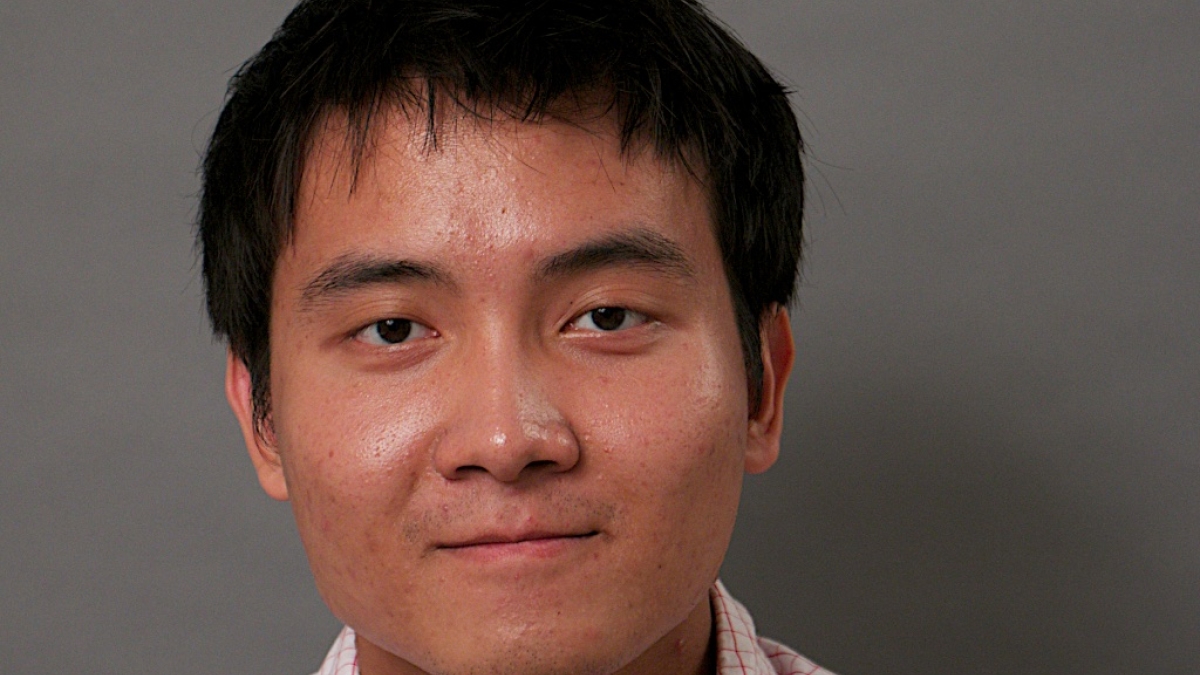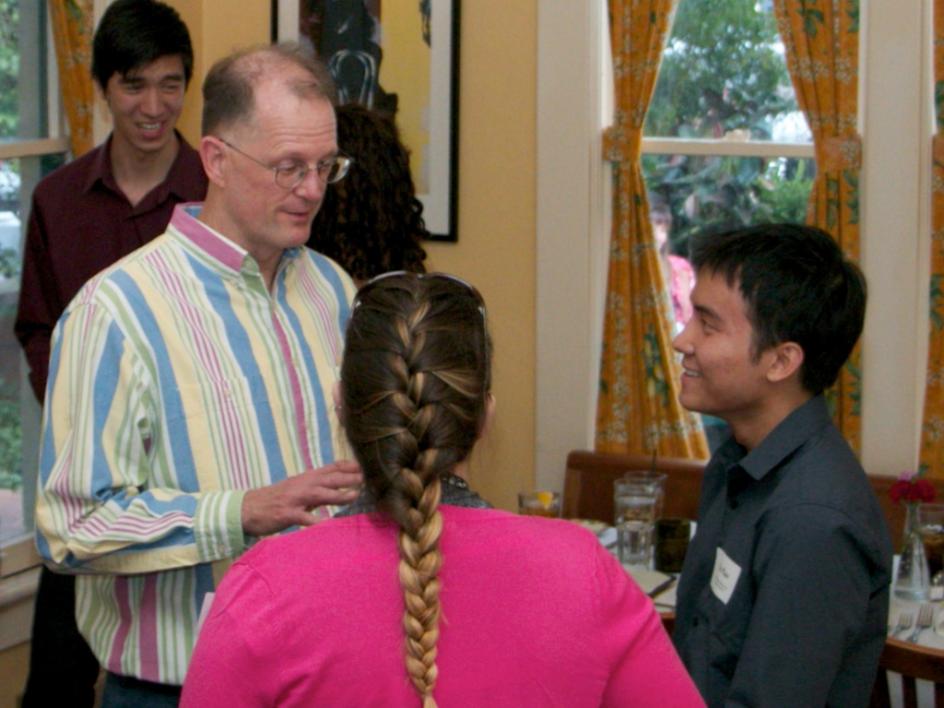Editor's note: This is part of a series of profiles for spring 2016 commencement. See the rest here.
Tin Phan, a dual major in mathematics and physics, will be receiving the College of Liberal Arts and Sciences Dean’s Medal for the School of Mathematical and Statistical Sciences at commencement ceremonies this spring.
Originally from Quy Nhon, Vietnam, Phan did not consider mathematics as a career path early on.
“Aiming to be a mathematician is unthinkable for a vast majority of Vietnamese,” he said. “In my community, being either a doctor or lawyer was the only way for a person to be considered successful. So it was natural that although I have always been good at math, I never entertained the idea that I would spend my life learning it.”
Phan had loved the subject of mathematics since his childhood, but it was not until college that he realized that doing mathematics “releases me from being worried about my own problems,” he explained. “It is something I am meant to do, so I embrace it.”
Getting involved in the Mentoring through Critical Transition Points (MCTP) initiative introduced Phan to conducting research as an undergraduate. He chose to focus on mathematical biology because of his love for nature and his ability to recognize patterns and connect ideas between different fields.
Phan met professor Yang Kuang during his MAT 475 Differential Equations class in his junior year. He considers Kuang to be his mentor and his greatest inspiration.
“Aside from the mathematical and biological knowledge, he also taught me many things that cannot be learned in a traditional classroom. He is definitely the main reason why I am here today,” Phan said.
After graduation, Phan plans to continue improving his mathematics skills by enrolling in the doctoral program in applied mathematics at ASU.
Tin Phan (right) chats with professor Eric Kostelich and other mathematics majors at the annual Jonathan D. and Helen Wexler Mathematical Sciences Senior Dinner.
Phan answered some questions about his experience at ASU.
Question: What was your “aha” moment, when you realized you wanted to study the field you majored in?
Answer: Aiming to be a mathematician is unthinkable for a vast majority of Vietnamese. In my community, being either a doctor or lawyer is the only way for a person to be considered successful. So it is natural that although I have always been good at math, I never entertained the idea that I would spend my life learning it.
But mathematics finds a way to grow in me and after my long adventure to many other fields, I saw the interconnected structure of knowledge in a deeper way than simply hearing someone say it. This network is like a puzzle and I came to the conclusion that mathematics is the key to connect all the pieces. I love the impossible, so I chose math.
Q: What’s something you learned while at ASU — in the classroom or otherwise — that surprised you, that changed your perspective?
A: Till this day, every day is a journey to a foreign land for me. In a world where winning and losing is separated by a blink of an eye, I tend to stretch my life slowly. As a result, I observe everything that happens around me and form my theory about them. There are many things that have surprised and helped me gain new perspectives while staying at such a diverse school like ASU. But the one thing that I treasure most is the realization that there are many people here at ASU who would enjoy the company of my strange humor and awkward self.
Q: Why did you choose ASU?
A: For most of high school, I had an unimaginably difficult time communicating with anyone. By the way, that is an understatement. Thus I wanted to choose somewhere close to home so that I could reach out to others in time of difficulty.
Since I lived next to the ocean (in Vietnam) for the most of my life, the temperature in my hometown never got anywhere close to 30 degree Fahrenheit. The winter here (in Arizona) felt so cold that I had to wear multiple sweaters and pants to go to school in February! So while choosing my college, ASU was the obvious choice for those reasons.
Now that my English is better and I can take on the weather, if I could go back in time, I would still choose ASU. It is such a great school in so many ways.
Q: Why did you decide to major in mathematics?
A: I find mathematics beautiful and powerful. I have loved the subject since my childhood, but not until college, when I realized doing mathematics releases me from being worried about my own problems. It is something that I am meant to do, so I embrace it.
Q: What do you like most about mathematics?
A: Everything, I do mean I love everything about mathematics, and I appreciate all the great mathematicians who have contributed so much to the fields. On my part, I chose to focus on mathematical biology because of my love for nature and my ability to recognize pattern and connect ideas between different fields.
Q: What do you like to do in your spare time, for fun?
A: Aside from constantly running around helping others with their homework and finding resources on campus, I play chess, Go, and read comic books.
Q: What’s the best piece of advice you’d give to those still in school?
A: I know what I am going to say is itself a contradiction, but this advice was given to me by people whom I have great respect for: “Do not listen to anyone.” More precisely, it means one should not take advice blindly, find his/her own path and walk on that path diligently.
Q: What was your favorite spot on campus, whether for studying, meeting friends or just thinking about life?
A: I basically lived in Hayden my freshman and sophomore years. Then I relocated to the PSF tutoring room during my junior year. Now, I more or less live in Wexler Hall. So statistically, my favorite spot is the PSF tutoring room. But suppose this is an exponential random variable, then it is memoryless, which means Wexler Hall is my favorite spot. (I just couldn’t help this.)
Q: What are your plans after graduation?
A: In the near future, I will be helping out with the MCTP program after graduation. Then I will attend a conference in mathematical modeling at Harvard. Afterward, I will be taking residence in the MTBI for two months and spend the last week of summer doing TA training.
I will then continue improving my mathematics skills by enrolling in the PhD program in applied mathematics at ASU. Meanwhile, I will be constantly involved with mentoring and helping other students just like everything I have been doing up to now. And of course, I will also be doing research on diseases through collaboration with other amazing researchers around the world.
I hope to work in something related to public health, math bio research and education after obtaining the necessary skills.
Q: If someone gave you $40 million to solve one problem on our planet, what would you tackle?
A: To solve any actual problem on our planet, $40 million is likely to be insufficient. Instead, I will create an organization that will simultaneously invest the money and fund the futures of promising people. This is a naïve and simple plan, but suppose it works. Then eventually, there will be enough resources to solve any problem on our planet.
More Science and technology

Swarm science: Oral bacteria move in waves to spread and survive
Swarming behaviors appear everywhere in nature — from schools of fish darting in synchrony to locusts sweeping across landscapes…

Stuck at the airport and we love it #not
Airports don’t bring out the best in people.Ten years ago, Ashwin Rajadesingan was traveling and had that thought. Today, he is…

ASU in position to accelerate collaboration between space, semiconductor industries
More than 200 academic, business and government leaders in the space industry converged in Tempe March 19–20 for the third annual…



